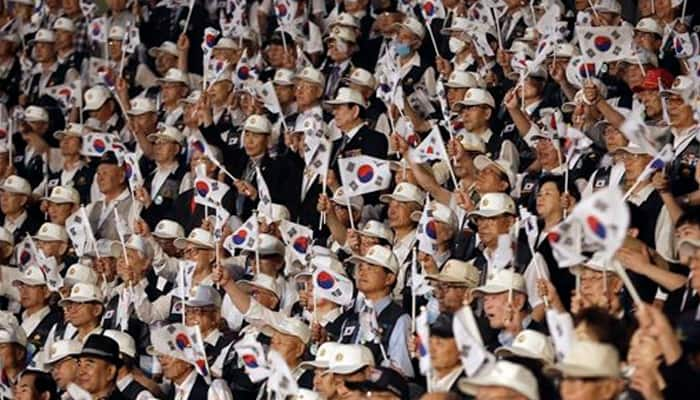Yeoncheon: After decades of official silence, South Korea is beginning to compensate hundreds of landmine victims maimed by a deadly, and dangerously enduring legacy of the Korean War and its Cold War aftermath.
Dwarfed in numerical terms by countries like Laos and Cambodia where landmines kill or injure hundreds each year, South Korean victims have largely been left to suffer in unrecognised isolation.
At least 1,000 are estimated to have died or been left disabled in recent decades, according to the Peace Sharing Association, a coalition of local anti-landmine civic groups. Among them, nearly 30 have been killed or maimed since 2005.
Now, 65 years after the conflict started, a law which came into effect in April is offering some financial support, including compensation payouts, to the injured and to the relatives of those who died.
Lawmaker Han Ki-Ho, who championed the bill, said there was a "terrible irony" in South Korea having donated 8.8 billion won (USD 8.0 million) since 1993 to UN campaigns to help landmine victims.
"And we spent next to nothing to help our own... it doesn`t make any sense," the former army lieutenant general told a news agency.
The military says more than 800,000 mines were planted along the tense border with North Korea during and after the 1950-53 Korean conflict as a defence against infiltration. Activists estimate the number at over one million.A particularly large number were air-dropped in the 1960s, residents and activists say, as incursion fears surged following the 1962 Cuban missile crisis and a 1968 cross-border mission by North Korean commandos to assassinate then-president Park Chung-Hee.
Many small anti-personnel mines were left unmarked or shifted from their demarcated positions over the years by rain and mudslides, posing a fatal hazard to farmers and children playing in the fields.
Lim Duk-Sung was 16 when he stepped on a landmine in 1978 while playing near a river around his home village of Wondang, some 55 kilometres (35 miles) northwest of Seoul, near the border.
The blast blew off his right foot and, after a series of painful surgeries, most of his leg below the knee was amputated.
The medical treatment left his already impoverished family bankrupt, while Lim dropped out of school and has battled depression ever since.
"None of us ever imagined protesting to the military or asking for compensation," Lim told AFP.
"That`s just the way things are here," he said.
There is no official data on the precise number of landmine victims, with activists saying they were effectively dismissed as necessary collateral in the constant struggle to secure the border against aggression from North Korea.
Many victims were poor, uneducated farmers or their children, as well as herb pickers searching the hillsides for medicinal plants. Few have dared to seek compensation.
"They were scared that they would be kicked out of their hometown if they `cause trouble`," said Kim Ki-Ho, head of the Korea Research Institute for Mine Clearance.
Once part of a heavily restricted military area, the border villages were re-opened in the 1960s, allowing many former residents to return.
But they were required to sign a waiver that absolved the military of responsibility for any undefined "accidents" in the future.
Life in these villages has always been coloured by the heavy military presence along the fortified border.
The army bans farmers growing tall crops to better monitor the border and, in the past, used to require villagers to wear certain colour clothes on a given day -- making it easier to spot North Korean spies. Land mine warning signs are still common around the area.
Although it stopped laying new mines in 2000, South Korea -- like the US, Russia, China and North Korea -- has not joined the more than 160 countries to have signed the Ottawa Treaty banning the use or production of anti-personnel mines.When the United States -- the South`s key military ally -- declared last year that it was halting the use of all anti-personnel mines, it made an exception for the inter-Korean border, citing the area`s "unique challenges".
Lawmaker Han agrees, arguing that landmines remain a crucial defence tool given that the two Koreas remain technically at war after the Korean conflict ended with a ceasefire instead of a peace treaty.
"I think we will be able to remove those mines once the two Koreas reunify," he said.
For Lee Tae-Ui, an 81-year-old farmer in the village of Wondang, the fate of the mines is all a bit academic.
Lee was eking out a living as a part-time scrap metal collector in the 1960s when the military offered him work clearing the area around the village of mines.
He lost his right foot when he stepped on an unexploded device and received nothing by way of compensation. The financial support being offered by the new bill has come too late to be of any real use to him.
"What`s the point of getting some money after all these years, when I`ll die soon anyway?" he said.
















